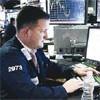Credit-default swaps soar
Bloomberg

refid:10502069 ilişkili resim dosyası
Russia, Brazil and the Philippines were the next most traded in November, New York-based broker GFI Group Inc. said in an e- mailed statement Tuesday. Investors buy credit-default swaps to speculate on a decline in bond prices or protect against losses.Turkey’s discussions with the IMF on a loan package to help the country amid more expensive credit conditions are at an "advanced stage," Economy Minister Mehmet Şimşek said Nov. 27. The global credit crunch is reducing the flows of foreign investment that Turkey has used to finance annual gross domestic product growth of almost 7 percent for the past six years. The cost of five-year credit-default swaps on Turkey dropped 45 basis points to 4.19 percentage points last month, according to Bloomberg data. It costs $419,000 to protect $10 million of the country’s debt from default.
Draining foreign reserves
Contracts protecting against a Russian default climbed as the country retreated from defending the ruble after draining nearly a quarter of the nation’s foreign reserves in less than four months in an effort to stem the currency’s decline. Investors pulled $190 billion out of the country, BNP Paribas SA estimates, as oil fell below the $70-a-barrel average required to balance the budget in 2009. Russia’s five-year credit default swaps soared 91 basis points to 7.08 percentage points in November, according to Bloomberg data. They reached 11.13 percentage points Oct. 27, the highest in at least eight years.
Credit-default swaps, contracts conceived to protect bondholders against default, pay the buyer face value in exchange for the underlying securities or the cash equivalent should a company or country fail to adhere to its debt deals.The automaker initially planned to complete the expansion by mid-2009, according to Nikkei.
Hyundai Motor, South Korea's top automaker, has curtailed production at its overseas plants in reaction to slowing sales, Yonhap News Agency reported Tuesday. The Hyundai factory in Turkey’s Kocaeli had halted production of the "Accent" model for three weeks last month, sending 600 workers on paid leave.
Ford Otosan, Ford Motor's unit in Turkey, was among the first auto producers to halt production. The firm had suspended manufacturing at its plant in the northwestern province of Gölcük between Nov. 13 and 26. Parsan Makina Parçaları Sanayi, a machine parts company, said yesterday it is halting production for 13 days. The company’s factory will not operate between Dec. 12 and Dec 22, and also between Dec. 29 and Jan. 5, according to a filing with the stock exchange.
















